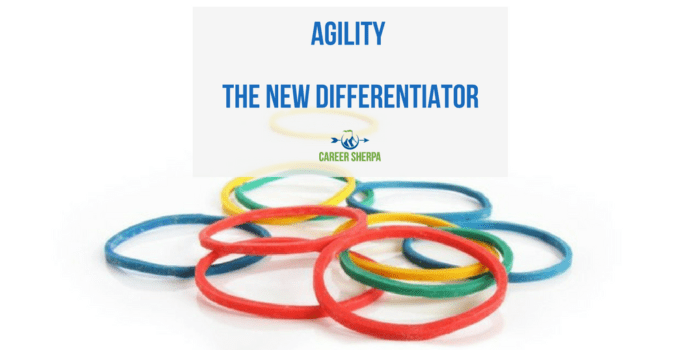Intellect, managing emotions and agility! These are the three things employers look for from today’s job candidate.
It’s no longer enough to have the education and knowledge. Employers want to see how well you interact with others and respond to change.
IQ, EQ, and AQ
Move over IQ and EQ, there’s a new measurement for success. AQ. I first learned about this triad in a FastCompany article, Screw Emotional Intelligence-Here’s The Key To The Future Of Work.
In case you need a refresher, here are the definitions:
IQ or Intelligence Quotient: The intelligence, knowledge, facts, and trivia that one possesses.
EQ or Emotional Quotient: The ability to manage and understand the emotions of yourself and others.
AQ or Adaptability Quotient: The ability to adapt to and thrive in quickly changing environments.
Workforce Trends
These workforce trends are the reasons why you want to start working on your agility.
- 4.2 years is the average tenure of a job (Department of Labor)
- 35% of the skills required to do job will change by 2020 (World Economic Forum)
- 45% of small businesses were unable to find qualified candidates (National Federation of Independent Business)
How Well Can You Adapt
As you can see, change is ever-present and coming at you faster than before. You have three choices when it comes to change:
- adapt
- quit
- coast
Coasting or staying but not adapting is a choice. But not a good one.
Your ability to adjust to change impacts your success on the job. So the best choice is to adapt. Not everyone adapts very well. Now would be a good time to assess your AQ, agility quotient?
Agility Quotient
You can take this self-assessment to see your agility score:
Adaptability Assessment
Learning To Be More Resilient
We crave stability and are creatures of habit, however, your job and career success mandate that you learn to be more flexible. Here are steps you can take to improve your agility when facing change:
Step 1: Recognize and understand the change
Step 2: Accept ownership of the change
Step 3: Plan how you will respond and adapt to the change
Step 4. Take Action and become a champion
Career Resilience
While we are on the topic of agility, it’s important to take ownership of your career resilience too. It is always better to feel like you have control over your career, rather than being an employer’s pawn.
- Be on the lookout for new trends and technology and learn how to use them.
- Keep networking with people inside and outside your industry.
- Set short-term and longer-term goals for professional development and career goals.
Yes, you can change careers, as long as you know how to connect the dots from what you did to what you want to do.
Show Your AQ Mastery
As you consider creating your promotional materials (LinkedIn profile, pitch, and resume), look for ways to demonstrate your EQ and AQ.
Look for proof that you work well under pressure, can adapt to changes and learn new things quickly. Don’t just use these phrases, but cite actual examples of times when you successfully achieved results.

Hannah Morgan speaks and writes about job search and career strategies. She founded CareerSherpa.net to educate professionals on how to maneuver through today’s job search process. Hannah was nominated as a LinkedIn Top Voice in Job Search and Careers and is a regular contributor to US News & World Report. She has been quoted by media outlets, including Forbes, USA Today, Money Magazine, Huffington Post, as well as many other publications. She is also author of The Infographic Resume and co-author of Social Networking for Business Success.

